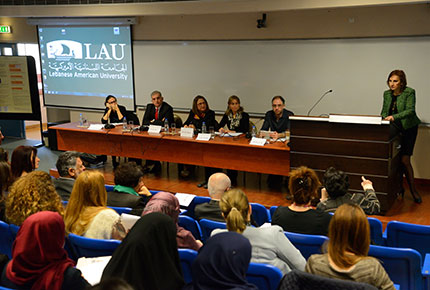Mutual comprehension: translators and the art of cultural mediation
LAU hosts symposium on translation and the promotion of cultural understanding and new knowledge.

The synergy between the message delivered by the experts and the students’ own concerns was evident at the event.
A group of budding translators from both LAU and other Lebanese universities gathered this past Thursday for a symposium titled “Translation: A Process of Knowledge Construction.” Hosted by LAU’s B.A. in Translation program, the event featured local and international experts who spoke about the role of translators in mediating between cultures, creating harmony, promoting peace and developing new knowledge.
“Translators construct content, cultural and linguistic knowledge that others would not otherwise have access to,” said Assistant Professor of English and Applied Linguistics Nuwar Diab, director of the B.A. in Translation. “In so doing, they promote cultural understanding and reduce prejudice,” she added.
The manner in which the translators carry out this mission, and the obstacles they encounter along the way, were discussed throughout the morning by four panelists, beginning with Gina Abou Fadel Saad, director of the School of Translation at the Université Saint-Joseph, who focused on the cognitive processes involved when a translator undertakes to render a text in another language.
Hoda Moukannas, former director of the Center for Languages and Translation at the Lebanese University, followed up with a well-received example of how translation connects cultures even across millennia. She discussed how fables that originated in ancient Persia came to be known to us through the translations of Ibn al-Muqaffa in the 8th century and Jean de la Fontaine in the 17th century. Moukannas pointed out that while the stories translated remain universal “their success is temporal, as we can read, rewrite and translate the same fables differently, explaining their meaning in a way that speaks to issues concerning contemporary readers.”
The second half of the panel turned to the hurdles translators face daily in their task. Jean Jabbour, professor of comparative literature at the Lebanese University and a translator of 21 books, spoke about the specific issues affecting translators in the Arab world. His presentation was complemented by that of Michelle Hartman – an associate professor of Arabic literature at the Institute of Islamic Studies, McGill University – who drew on her experience to illustrate the difficulties of translating literary works from Arabic into English.
“You always need to be aware of the political context” of the original text, Hartman emphasized. This entails paying close attention to how the translation might reinforce negative stereotypes, and wrestling with the philosophical question of how to avoid doing so while remaining true to the author’s intent.
Poster presentations by senior students in the translation program succeeded the panel. The synergy between the message delivered by the experts and the students’ own concerns became quickly evident. For example, Jabbour’s talk spoke to the heart of student Ghiwa Abi Haidar’s final year project, “Translating Arab Women’s Literary Works into English: How They Are Changed to Fit a ‘Foreign’ Readership.” “He talked about how translators of works by Arab women focus on the exotic, on oppression and patriarchy – and this is exactly what I am researching,” Abi Haidar enthused.
For Diab, the symposium showed students “the kinds of difficulties to expect when dealing with a text,” gave them strategies to overcome them, and made them aware that “these difficulties are shared by expert translators and that they can be ironed out with practice.” Arming students with this kind of knowledge ensures that they are better prepared to enter the world of professional translation, she added.
Habib Sayegh, the owner of Librairie du Liban graciously donated 77 copies of An-Nafees to the symposium participants. This remarkable English-Arabic dictionary by the late Magdi Wahba provides rich and unique Arabic terminology for translators.
More
Latest Stories
- Into the Psychology of Justice
- Alumnus Zak Kassas on Navigation, Spoofing and the Future of GPS
- Hearing Between the Lines
- LAU Hematology Conference 2025: Advancing Science Through Interdisciplinary Exchange
- Dr. Chaouki T. Abdallah Invested as LAU’s 10th President
- LAU Guides Its Students Through the Code of Conduct
- Innovative Procedure at LAU Medical Center–Rizk Hospital Signals Hope for a Patient With a Congenital Disease
- LAU’s Inaugural PodChat Session Addresses AI Detection in the Classroom

